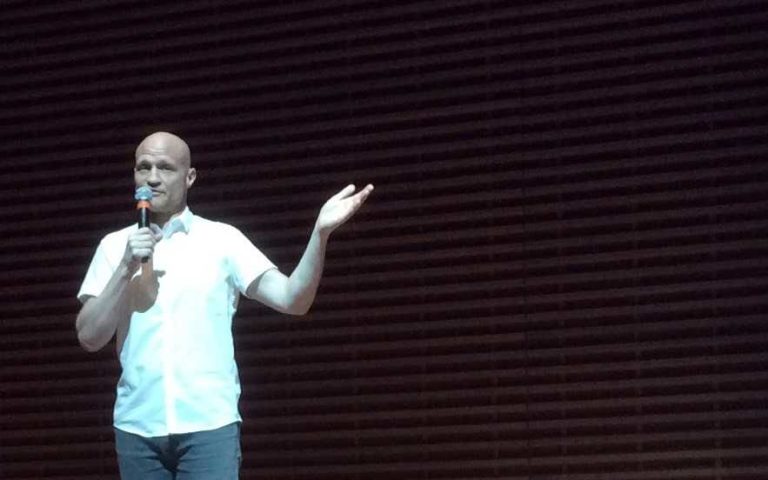The Onion co-founder Scott Dikkers gave a talk on writing comedy and growing a publication at CEMEX auditorium on Thursday night.
The event was hosted by Stanford Speakers Bureau (SSB) and was the organization’s first event of the year. According to SSB, Dikkers has unique experience in both business and politics.
“Mr. Dikkers’s work lies at the intersection of both of those areas, so we figured a lot of people would be interested,” wrote Myriam Yao ’20, Director of Cosponsorships for SSB, in an email to The Daily. “Mr. Dikkers can speak to a lot of things, from how to build a successful business to the role of political satire in today’s polarized climate.”
Dikkers began the talk with a description of his upbringing in Minneapolis, including his experience starting The Onion with peers at the University of Wisconsin-Madison. Dikkers, who began his career in comedy by drawing comics, described the transition to writing satire as “stepping across two stones in a little pond.”
“The secret I learned about cartooning is that good writing is what makes a good cartoon,” he said in an pre-presentation interview with The Daily.
Dikkers told the audience numerous anecdotes about his history taking The Onion from a magazine to a website, and later to a parody news program.
“We’re hoping that students come away with a better understanding of the unorthodox ways in which people [can] build successful businesses,” Yao wrote.
She added that she hopes students also leave with “renewed motivation to build their own careers around things that they enjoy doing, and that [they] make the world a richer, more colorful place.”
The process of growing The Onion was sometimes difficult for Dikkers, who explained to the audience how he continued to work at the publication while homeless. Nevertheless, he said he considers the experience as one of the best in his life.
“I was doing what I loved, I was passionate about it, I was finally reaching a wider audience,” he told the audience. “Which is why I believe so strongly that we have to find our mission, and do what we need to do because that’s really the secret to happiness. We get so caught up in the idea of being successful financially in this culture; it’s just wrong, and you can’t really understand that until you lived it.”
After Dikkers finished his prepared remarks, he answered several questions from the audience.
When asked about his thoughts on comedy in the context of the Trump administration, Dikkers mentioned the many techniques that a comedian uses to create satire.
“There always will be – and there always have been – terrible, stupid people doing awful, stupid things that make the world a terrible place. A satirist’s job is to point that out and try to bring them down a peg … For me it’s more fun because it’s more challenging to come up with ways to do it,” he said.
One audience member asked Dikkers if there was anything in his life that he would change in retrospect.
“I would have gone into priesthood, I think,” he jokingly replied before explaining that he wouldn’t change much, because he had to learn how to use humor to connect with people.
“I was always just awkward and weird and off-putting,” Dikkers said. “I think I turned to comedy as a way to connect with people since I couldn’t connect with them in more traditional ways, like going to parties or being friendly with them.”
Audience members frequently laughed at Dikkers’s jokes.
“It’s always inspiring to see someone who’s really got it figured out,” said Devin Cintron ’20, editor of the Stanford Flipside. “We really appreciated being reminded that the world provides plenty of inspiration.”
Contact Michael Espinosa at mesp2021‘at’stanford.edu.
